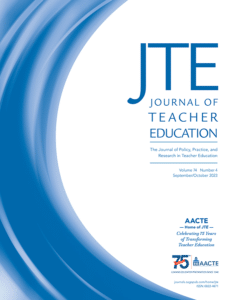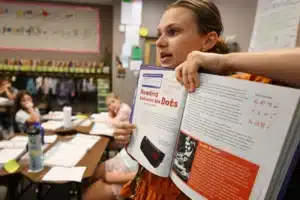16 Oct2023
Championing Special Educators: Strategies for Recruitment & Retention in Educator Preparation, a Collaboration Between AACTE and CEEDAR
By Brooke Evans
Teacher educators across the nation are invited to join the newest national affinity group, Championing Special Educators: Strategies for Recruitment & Retention in Educator Preparation, and our first meeting is “spooktacularly” on Halloween!
AACTE is collaborating with the Collaboration for Effective Educator Development, Accountability, and Reform (CEEDAR) in order to offer AACTE members the opportunity to glean insights from comprehensive educator preparation programs and educational partners who have excelled in recruiting and preparing candidates to become fully licensed special educators.
More specifically, this affinity group professional learning series will highlight successful strategies that educator preparation programs (EPPs) have employed to increase enrollment of special education candidates, including collaborating with K-12 districts, universities and community partners, and utilizing data collection efforts to drive decision-making.
16 Oct2023
By Virginia State University (VSU)
The Virginia State University (VSU) College of Education has announced a new teacher residency program to help with the teacher shortage in Petersburg, VA, and provide future educators with an immersive educational experience.
Finding quality teachers has been a struggle for Petersburg in recent years, much like for schools nationwide. When Petersburg realized some of their K-12 classrooms would be overcrowded this upcoming school year, they came to VSU seeking stellar students interested in doing an early teacher residency. In August, the HERO program was born.
HERO, or Hybrid Education Residency Opportunity, is a comprehensive and innovative program that combines coursework and practical teaching in an actual classroom setting.
16 Oct2023
By Robin Fuxa
If you are active in your state’s association – or curious about building your advocacy toolkit – make time to attend the AACTE/ACSR Virtual State Leaders Institute on November 1 from 12 p.m. to 5 p.m. ET.
This half-day online event is an accessible, affordable way to learn the latest developments on state policies impacting educator preparation and to engage with leaders in our field from around the country. Sessions will focus on policies addressing the teacher shortage, the science(s) of reading, and academic censorship; our other thread will focus on practical “know-how” sessions on state leadership for those new to affiliate leadership or those considering seeking a leadership role.
16 Oct2023
By New Jersey Association of Colleges for Teacher Education (NJACTE)
Educator preparation programs (EPPs) in New Jersey are engaged in a nonstop cycle of recruiting, training, and graduating teachers for the state, which has experienced a severe teacher shortage. The design and practices of these programs are substantially influenced by policies of both the state and accrediting organizations. What do busy practitioners at EPPs do when policies that directly affect their work are in flux?
In 2022, New Jersey Governor Phil Murphy signed into law S.896, which removed the requirement for teacher candidates to complete a state-approved performance-based assessment, including the previously required and widely critiqued edTPA, and provided each EPP the authority to design or select its own performance-based assessment. The edTPA had been a significant, time-intensive process for teacher candidates, and EPPs had deeply integrated edTPA into their curriculum and dedicated resources to support candidates’ successful completion of edTPA’s components. This policy change has the potential to fundamentally transform daily practice, program design, and student experiences across New Jersey’s EPPs.
16 Oct2023
By Michelle Damiani
The AACTE Co-Teaching in Clinical Practice Topical Action Group (TAG) recently wrapped up two exciting initiatives focused on bringing teacher preparation faculty together with administrators and teachers in schools across the country. A recurring theme coming from our TAG activities emphasizes the need for systemic change, something that will most effectively occur with collaboration across institutions and school-university partners.
Teacher preparation institutional partnerships with local school districts where co-teaching is valued seem to be increasing expertise for clinical interns, practitioners, and the higher education teacher preparation faculty involved.
11 Oct2023
By Weade James
The AACTE Holmes Program supports students who self-identify as racially and ethnically diverse and are pursuing graduate degrees in education at AACTE member institutions.
With 65 active member institutions, the Holmes Program continues to grow to include new members and diverse scholars who are pursuing graduate degrees in various specialty areas. AACTE is proud to welcome new scholars from Texas Christian University, the University of Nevada Las Vegas, and the University of North Carolina at Charlotte.
10 Oct2023
By AACTE

AACTE kicks off its three-week countdown to the early bird registration deadline for its 2024 Annual Meeting, February 16 – 18 at the Gaylord Rockies in Denver, CO. You still have time to take advantage of the biggest discount on rates and participate in the premier educator preparation conference in the nation.
10 Oct2023
By Kathy McDonough, Sonia Nieto, Valerie Hill-Jackson and Cheryl Craig
 On the occasion of AACTE’s 75 years of transforming teacher education, and in the wake of the U.S. Supreme Court’s recent challenges to race-conscious policies for college admissions, co-editors Valerie Hill-Jackson and Cheryl Craig of the Journal of Teacher Education (JTE) seize the opportunity to offer an issue dedicated to equity.
On the occasion of AACTE’s 75 years of transforming teacher education, and in the wake of the U.S. Supreme Court’s recent challenges to race-conscious policies for college admissions, co-editors Valerie Hill-Jackson and Cheryl Craig of the Journal of Teacher Education (JTE) seize the opportunity to offer an issue dedicated to equity.
With the expertise of Kathy McDonough and Sonia Nieto as guest editors, this groundbreaking publication attempts to “Place Equity Front and Center” in Teacher Education in a Time of Crisis. The issue begins with an editorial that (a) reviews the long history of injustice in the United States over four centuries, (b) reconsiders major cultural shifts since the start of the 21st century that impact teacher education specifically and education more broadly, and (c) highlights the promising pedagogies for responsibly bringing equity to the fore in teacher preparation classrooms.
Inside the issue, a powerhouse compilation of eight peer-reviewed articles is representative of novel research — on topics ranging from equity and teacher dispositions to equity and technology — by thoughtful and committed scholars. Issue four, of volume 74 of JTE, affirms that equity is the bedrock of teacher education, so it leans into a timely conversation on the topic. It’s a must-read collection for policymakers, practitioners, and researchers for the field of teacher education. Access the issue.
10 Oct2023
By Maria Alayza

Leaving my home country of Peru was a courageous decision that changed my life eight years ago. I expanded my worldview in ways I had never imagined. What started as an idea of completing my bachelor’s degree, resulted in a master’s degree, and now a doctoral degree is in progress. As a Hispanic immigrant, I encountered unique experiences that I will share in honor of Hispanic Heritage Month. My intention is to normalize, validate, and celebrate the experiences of students like me and to inform the broader community of the unique endeavors minority groups encounter in their journeys.
10 Oct2023
By Kaitlyn Brennan
As teacher shortages continue to impact schools across the nation, some schools in Montana are turning to virtual teachers due to the increasing number of vacancies.
For the first time, some Florence-Carlton High School math classes are being taught by virtual teachers provided by the state-funded Montana Digital Academy. Classes like pre-calculus and geometry had always been taught by in-person teachers at the school.
09 Oct2023
The School of Education and Human Development will lead research to support future educators.
By Ruben Hidalgo
 This article was originally published by Texas A&M Today.
This article was originally published by Texas A&M Today.
Texas A&M University will address the demand for teachers in Texas with the help of a $3 million Hispanic Serving Institution capacity-building grant from the U.S. Department of Education.
Through the five-year grant, the School of Education and Human Development (SEHD) will lead the development and assessment of a pilot program to recruit, mentor, and retain students who want to major in education or human resource development.
During the pilot, SEHD will provide its expertise in academic coaching, advising and essential services as well as partner with academic units and divisions across the campus, including the Division of Student Affairs and the Department of Admissions and Undergraduate Recruitment and Outreach.
09 Oct2023
8 Utah school districts are paying licensed, first-year teachers $60,000 annually to start, a salary one principal calls a ‘game changer.’
By Marjorie Cortez

First-year teacher Margaret “Maggie” Johnston holds up a workbook as she works with her students at Crescent Elementary School in Sandy on Tuesday, Sept. 19, 2023. Scott G Winterton, Deseret News
This article was originally published by Deseret News.
Margaret “Maggie” Johnston carefully weighed her career options before graduating from Iowa State University with a bachelor’s degree in education.
When it came time for her student teaching, the lifelong Iowan made bold choices: teaching eight weeks each in New Zealand and Utah’s Canyons School District.
Johnston said she chose to student teach out of state and out of the country because she wanted to experience places she had never been while she was young.
When she completed her training, she returned to Utah to start her career teaching fifth grade at Crescent Elementary School in Sandy.
It wasn’t a coincidence that Johnston landed in Canyons District. For the past five years, the district has developed a working relationship with Iowa State’s School of Education to help cultivate new talent and introduce teacher candidates to Canyons’ schools and Utah’s quality of life.
09 Oct2023
By Brooke Evans
AACTE is pleased to offer Lunch and Learns, new professional development opportunities for members. These 30-minute sessions are designed to provide you with an immediate tool or strategy that you can immediately apply to your work. Can’t make it virtually? All Lunch and Learns will be available on-demand just for AACTE members. Watch them during your lunch break or whenever it is convenient for you.
AACTE will continue its new Lunch and Learn Series on Wednesday, October 18, from 1:00 – 1:30 p.m. ET with Lesson Planning: Generative AI Tools for Teachers and Teacher Educators. Guy Trainin (University of Nebraska-Lincoln) will teach participants about various AI tools, their functionalities, and best practices so that these tools can enhance teaching and not just serve as a novel addition. Furthermore, he will discuss ethical considerations, such as data privacy and avoiding algorithmic biases, ensuring that the implementation of AI is not only effective but also responsible.
09 Oct2023
By Kaitlyn Brennan
This weekly Washington Update is intended to keep members informed on Capitol Hill activities impacting the educator preparation community. The views expressed in this post do not necessarily reflect the views of AACTE.
Because Kevin McCarthy was ousted as Speaker of the House, the House is effectively paralyzed until a new Speaker is chosen. House Majority Leader Steve Scalise, the number two House Republican, announced his candidacy, along with Rep. Jim Jordan (R-OH), chairman of the House Judiciary Committee and a founding member of the conservative House Freedom Caucus. The election process begins today with a closed-door Republican meeting and voting on a new Speaker by the full House is scheduled for Wednesday.
03 Oct2023
By Kaitlyn Brennan
This weekly Washington Update is intended to keep members informed on Capitol Hill activities impacting the educator preparation community. The views expressed in this post do not necessarily reflect the views of AACTE.
On Saturday evening, with just hours to spare and with bipartisan action, Congress extended current government funding for 45 days – to November 17, preventing a government shutdown that otherwise would have occurred at the start of the new fiscal year on Sunday, October 1.
The bill is described as a relatively “clean” continuing resolution (CR), without the deep funding cuts to most domestic programs that some hardline conservatives sought or the emergency funding for Ukraine that many Democrats and some Republicans wanted. It remains to be seen what the decision to move forward with bipartisan action could mean for House Speaker Kevin McCarthy.








 On the occasion of AACTE’s 75 years of transforming teacher education, and in the wake of the U.S. Supreme Court’s recent challenges to race-conscious policies for college admissions, co-editors Valerie Hill-Jackson and Cheryl Craig of the Journal of Teacher Education (JTE) seize the opportunity to offer an issue dedicated to equity.
On the occasion of AACTE’s 75 years of transforming teacher education, and in the wake of the U.S. Supreme Court’s recent challenges to race-conscious policies for college admissions, co-editors Valerie Hill-Jackson and Cheryl Craig of the Journal of Teacher Education (JTE) seize the opportunity to offer an issue dedicated to equity.
 This article was originally published by
This article was originally published by 